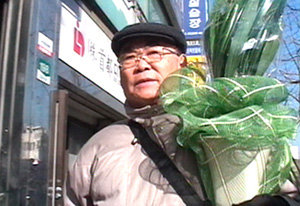Being Aged Is Not Guilty, Dont Ignore the Youth.
Being Aged Is Not Guilty, Dont Ignore the Youth.
Posted January. 23, 2005 23:06,

In Korean society, age is a very sensitive issue in relationship. It is commonly found that even strangers ask each others age during a casual talk. So, the fact that you are younger than the other can sometimes create discrimination in promotion at work or relationship. However, a new social phenomenon discriminating the older generation has been prevalent enough to create neologisms: Sa-O-Jeong (Sa means four and O means five in Korean, and Saojeong is a cartoon character, too.)which indicates that the age of 45 is the time of retirement, and O-Ryuk-Do (O means five, Ryuk means six, Do means thief in Korean, also Oryukdo is a name of Island) is a negative reference indicating people who keep their jobs in their 50s and 60s as thieves.
The Educational Broadcasting Station will air a documentary series titled, The Condition of Future-Korea, the Republic of Age. This show will openly bring people who are discriminated due to age upfront from January 24 to 29 at 11PM. It will examine the discrimination of minors to the elder and the prejudices toward the female singles in their 30s and the jobless in their 50s.
The first show titled How old are you? will close up a case of a student (Jeong Jin-moo) who slipped to entering college due to the policy of putting a premium to the younger contestant when the scores were equal. Mr. Jeong attends the school he applied after appealing his case to the National Human Rights Commission of Korea.
The second show, Change it! The Challenges of 1318(age between 13 and 18), will illuminate the discrimination and human rights infringement that juveniles receive. The show reports plenty of cases of youth part-timers who went through human rights infringement.
The third show, The bitter competition at job finding: age limitation will raise issues on age limitation restrictions in the job market by exemplifying a case of Mr. Choi Yeong-jo, who succeeded seeking a position at the Human Resources Development Service of Korea creating a record as the oldest rookie.
The fourth show, A society encouraging retirement, points out the social condition identifying old age as incompetence. In Korea there have not been a research studying the impacts to society and economy of early retirement in ones 40s or 50s.
The final show, Age merely means numbers, collects various cases that broke the prejudices against age: a 68-year-old quick delivery man, a corporation destroyed the traditional referring custom, the students who succeeded in starting their own businesses breaking down the hierarchical culture of the society.
Sun-Woo Kim sublime@donga.com




![“잠만 자면 입이 바싹바싹”…잠들기 전에 이것 체크해야 [알쓸톡]](https://dimg.donga.com/c/138/175/90/1/wps/NEWS/IMAGE/2026/02/23/133404749.3.jpg)


